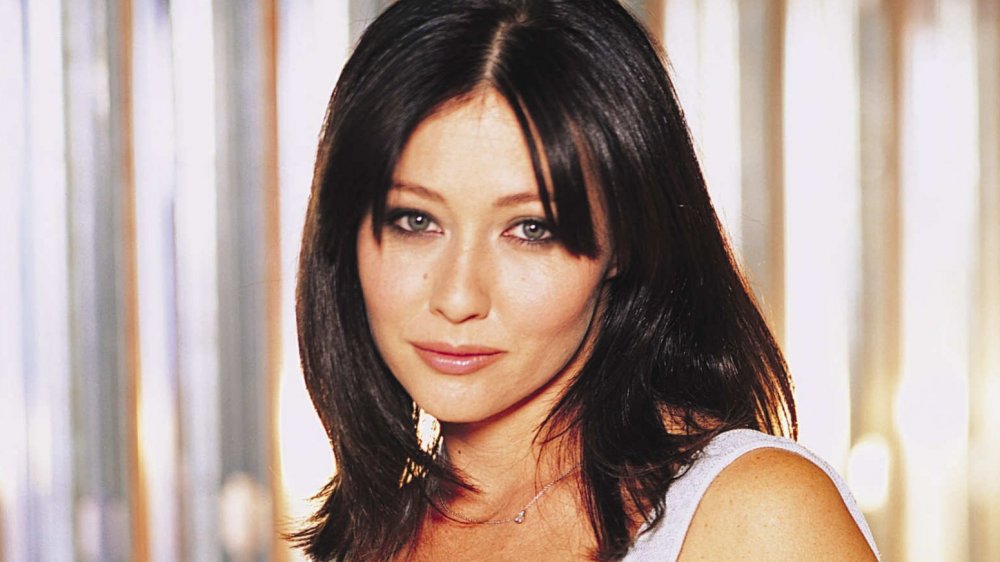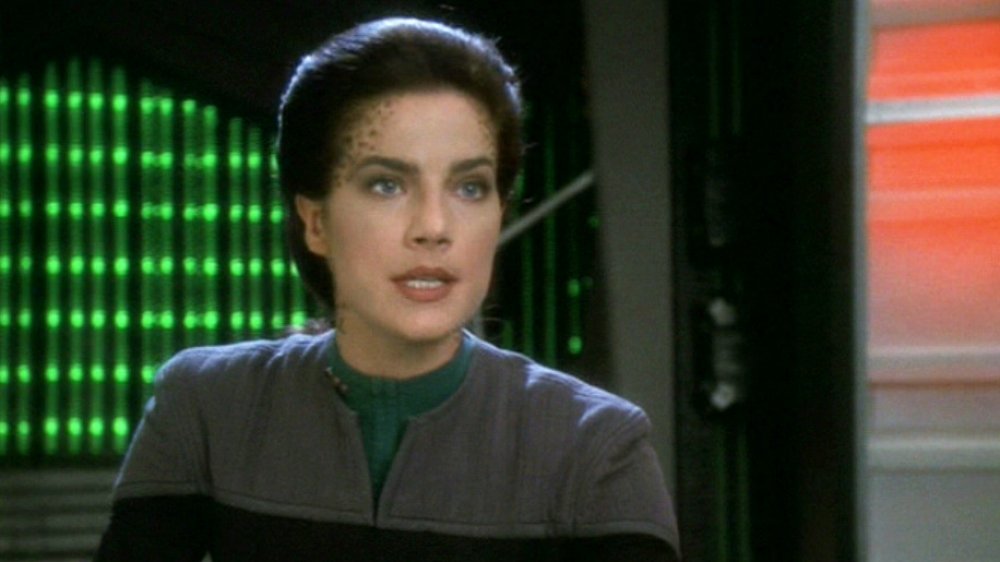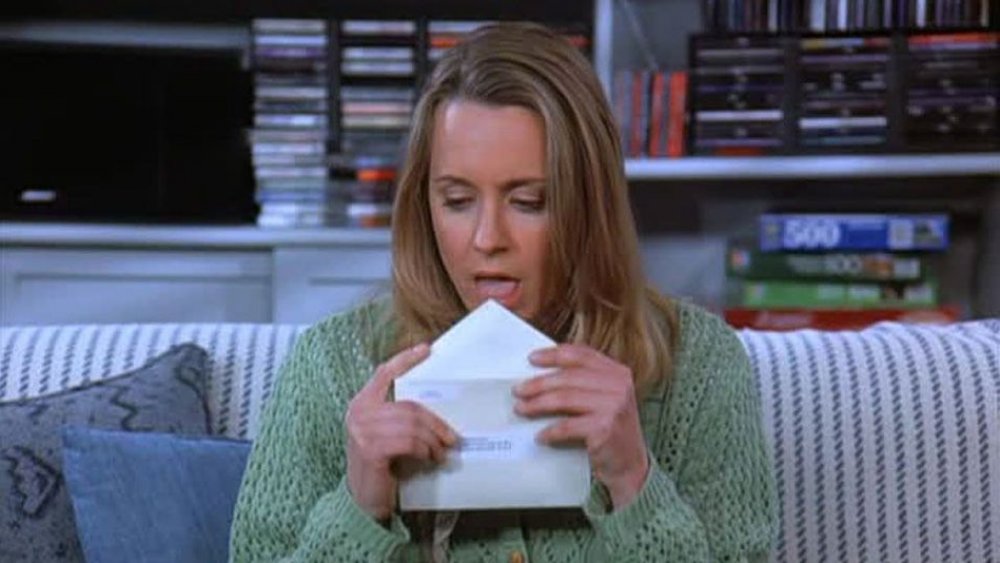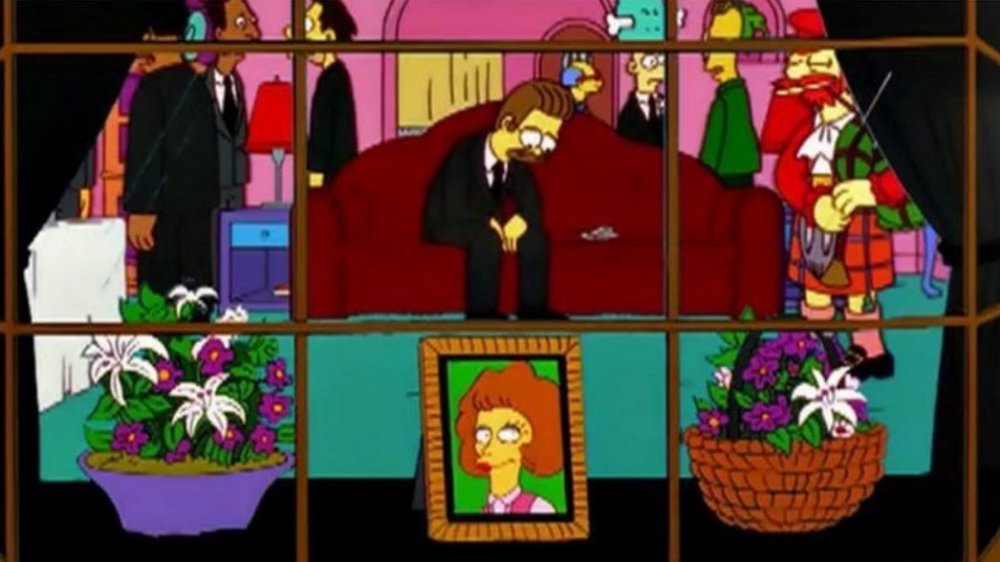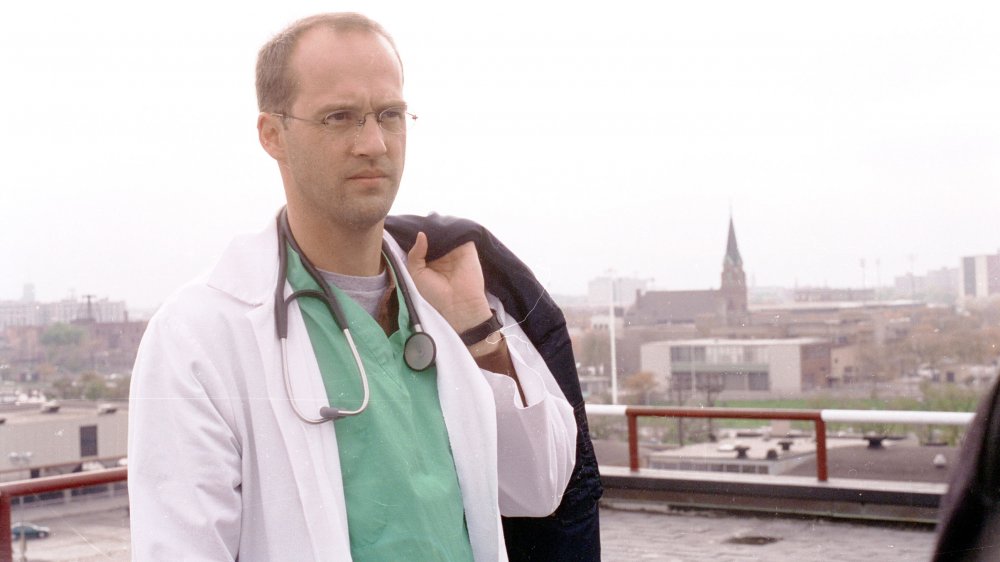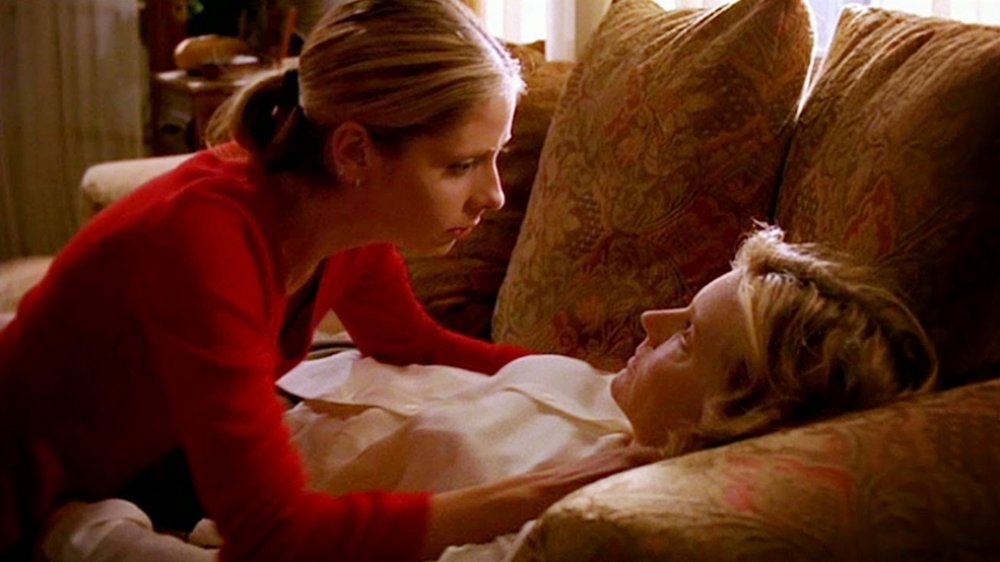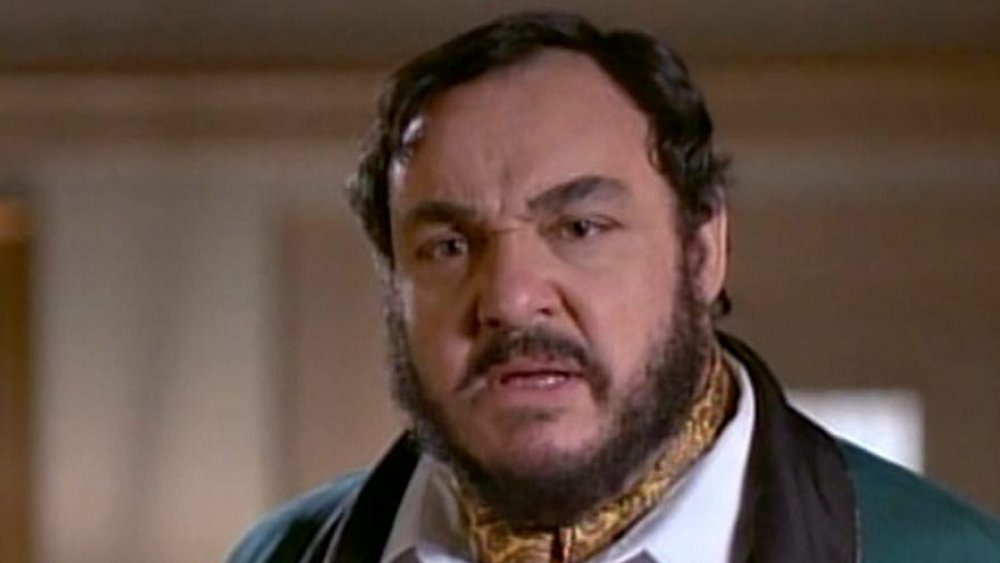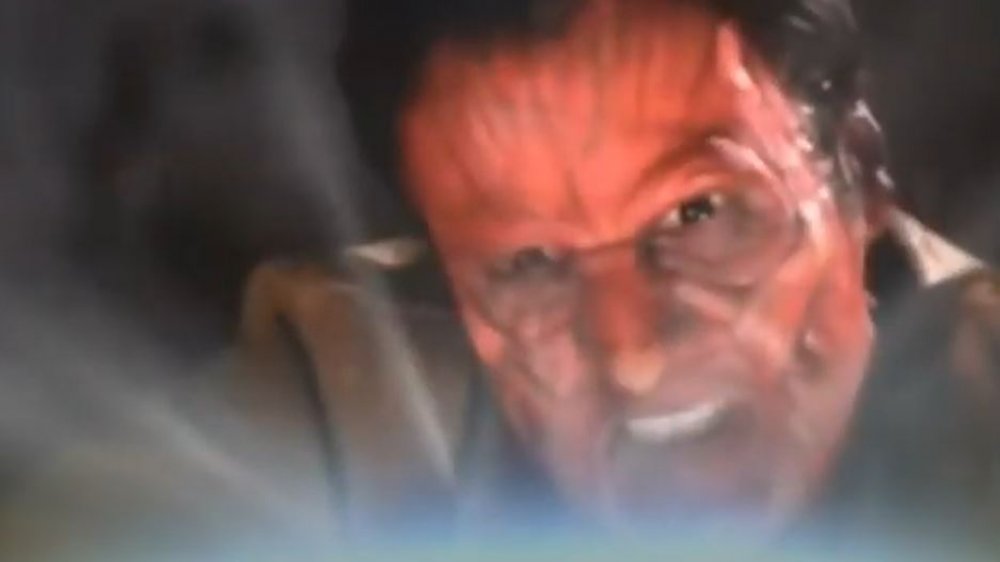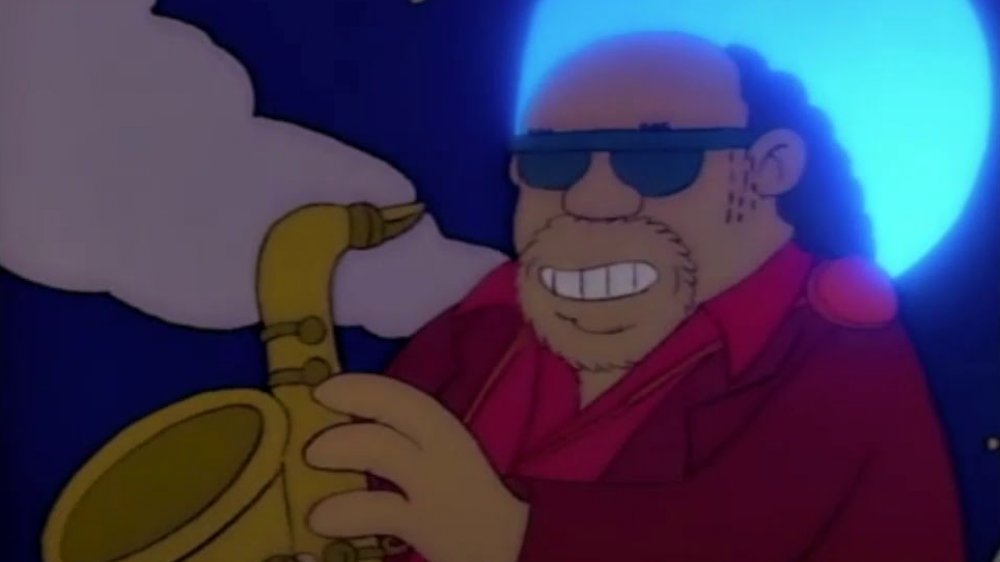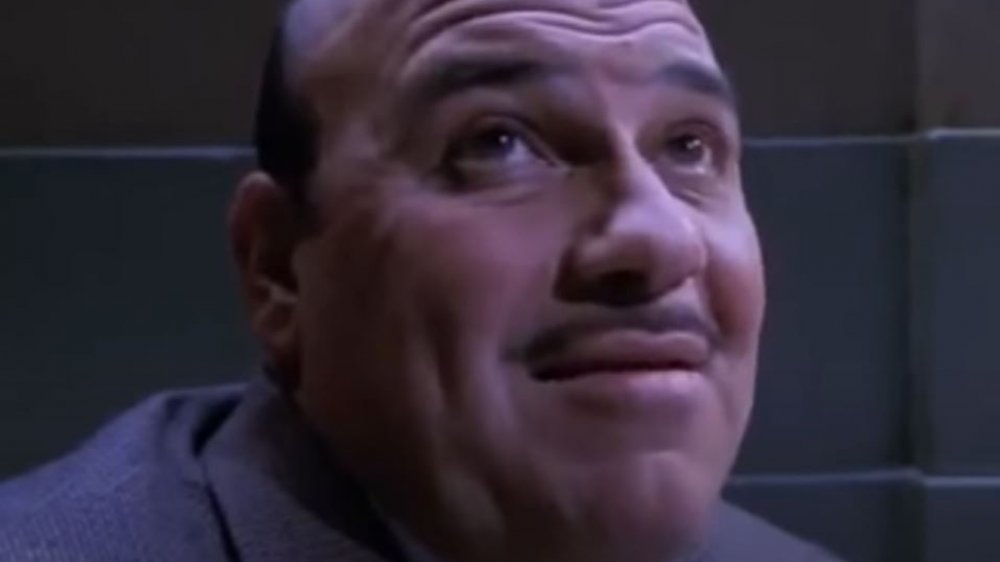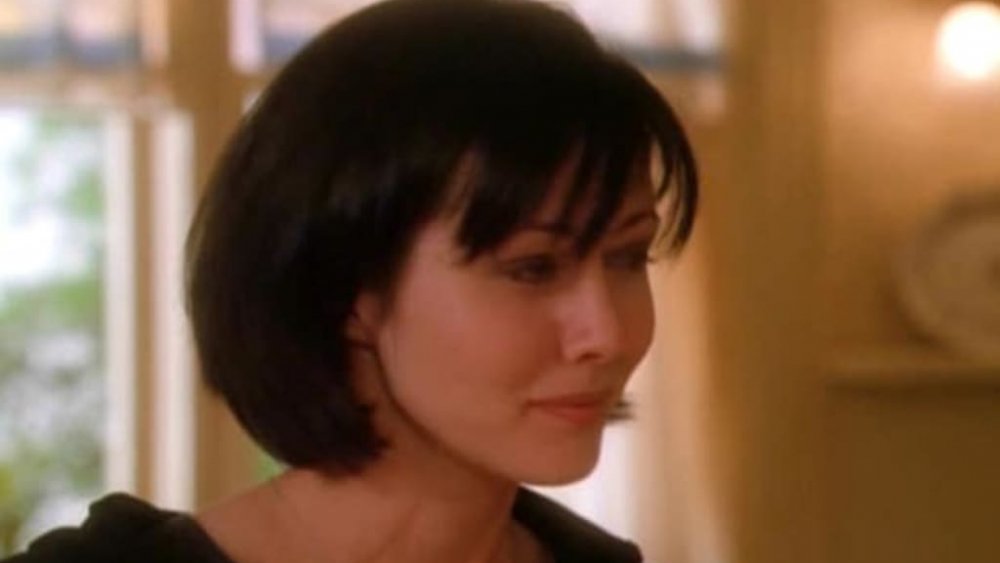The Real Reason These Popular '90s TV Characters Were Killed Off
Back when gossip columns took up space in the New York Daily News instead of bandwidth on TMZ, actors exiting shows made for compelling material. This was especially true when a character was killed off. Why did such a beloved figure meet such a violent end? Was it always part of the plan? Was the actor too much trouble to keep around? Did they quit or were they fired? The 1990s had a plethora of great shows on offer, but some of the juiciest drama wasn't crafted by TV writers — it was lived by them and their colleagues, in their efforts to keep their production chugging along. No wonder there are so many movies and TV shows about Hollywood.
In tribute to this bygone news cycle, we're taking a look at some of the '90s most infamously killed-off characters. These were popular characters, featured in beloved productions — their falls were shocking, and often remain controversial this day. Why did they die? Who swung the metaphorical axe? How did the actors cope? Speculate no longer — we're here to answer those very questions. Put your mind at ease with this exploration of characters who bought the farm in '90s prime-time, and why.
Jadzia Dax died because Rick Berman wouldn't lighten her load
Jadzia Dax is one of the most beloved characters from Star Trek: Deep Space Nine. She's also the only core cast member who doesn't survive all seven seasons. This is because actress Terry Farrell wanted a lighter schedule for the final season, but Star Trek franchise head Rick Berman wouldn't allow it.
Berman kept Trek actors and writers on a tight leash. According to Farrell, she was offered an audition for a program with Jerry Seinfeld after she appeared on the cover of TV Guide. But Berman refused to give her the mere five days off she needed. At the end of season six, Farrell was worn out after years of work, and wanted to bring better balance to her life. She pitched the idea of Dax becoming a recurring character in season seven instead of a main one. Berman told her it was all or nothing: She could return as a main character, or get killed off. She didn't want Dax to die, but she was left with no choice, and decided not to renew her contract. Thus, Gul Dukat kills Jadzia Dax at the end of the season. She is replaced by Ezri Dax in season seven.
Though Farrell has been civil regarding Berman in most interviews, elsewhere, she's been less diplomatic. As she told Pop Mythology, "I was sorry too. I really wanted to be a recurring character but Rick Berman wouldn't have it."
Susan died from a lack of chemistry, not poison glue
As a relatively normal character in a stable relationship, Susan Ross is an anomaly on Seinfeld. As George's girlfriend and fiancée, she appears in 29 episodes. She is infamously killed off after the cheap glue on her wedding invitations poisons her, a loss George shrugs off.
Rumors circulated for years that Susan was killed off in such a cold way because the cast didn't like dealing with her actress, Heidi Swedberg. Jason Alexander revealed the true story in 2015: Swedberg is an esteemed person and professional, but he "couldn't figure out how to play off of her" and her very different comedic instincts. When series co-creator Larry David brought her back to play George's fiancée, Alexander raised objections. David stood firm: Susan was too good of a punching bad to lose. Thus, Susan returned.
During post-taping lunches with David and the core cast members, Alexander would frequently vent about his experiences. After filming an episode in which Susan has multiple scenes with Elaine and Jerry, Julia Louis-Dreyfus and Seinfeld finally understood Alexander's issues. Louis-Dreyfus made an offhand remark about how she wished they could kill Susan, and David immediately knew how to end the engagement storyline. This account was later corroborated in the book Seinfeldia. Alexander later regretted how he described Swedberg during the interview, and issued an apology to her via Twitter after harassment started.
The voice of Maude Flanders needed more money
The death of Maude Flanders is one of the most consequential moments in Simpsons history. The victim of a T-shirt cannon firing gone wrong, Maude's death forever changed the dynamic of a show where continuity never seemed to matter all that much. Maude wasn't just killed off for new storylines, though — she was killed off because her voice actress was embroiled in conflict over money behind the scenes.
Simpsons producers revealed that a character would be killed off on February 13, 2000. Most deduced it would be Maude, since actress Maggie Roswell had already left the show. She'd been with the show since its debut, but had moved from LA to Denver. Fox put out a statement saying she left the show because the move made doing voiceover work too logistically difficult. Roswell disputed that claim to the LA Times, saying she left because the show wouldn't give her a raise.
Roswell explained the situation in more depth years later. Both claims were, in a sense, true: She wanted a raise, in part because of all the travel suddenly required to do her job. Flying back and forth to spend just a day or two recording was simply too expensive to continue doing without greater pay. But a few years after she quit, she came to a new arrangement with Simpsons producers. She now records using a phone patch to LA.
Dr. Mark Greene's death was in the works for years
In an operating room with a revolving door constantly admitting new cast members, Dr. Mark Greene was a rare and beloved constant on ER. He is the first face viewers see in the 1994 pilot, and is, arguably, the main character for the first half of the series. Tragically, he dies at the end of season eight due to a brain tumor. This exit was actually planned by actor Anthony Edwards himself, and expertly executed over the course of two seasons by the series' writers.
Edwards shocked the TV world when he announced season eight would be his final one in the white lab coat. As he told The Associated Press, he wanted to spend more time with his family: "It's been eight years of my family working around my schedule. It's been a long time playing Dr. Greene." As we now know, Edwards had known of his exit long before it was made public — he and the crew were planning his departure back in season seven.
This long lead time gave the writers two years to plan Greene's final story and set up an emotional goodbye. As Edwards recounted to Yahoo TV, "The first year was the medical part of it ... and then the second year was really the emotional journey of someone transitioning." The final scene and funeral still make him tear up, years later.
Joyce Summers died so the Scooby Gang could deal with non-vampire loss
"The Body" is one of the most acclaimed episodes of Buffy the Vampire Slayer, itself an enormously beloved series. For the uninitiated: Buffy comes home to find her mother Joyce dead on the sofa after a brain aneurysm. Buffy and the Scooby Gang spend the rest of the episode coming to terms with what Joyce's death means to each of them. This is especially hard-hitting for Buffy. Losing her mother is difficult enough, but losing her to something she can't fight against is devastating. Buffy is the Slayer, after all, sworn to beat back evil wherever it hides. But there's just no staking an aneurysm through the heart.
It's a legendary and tender hour of television, but it also raises a major question: Why did Joyce Summers have to die? Turns out, it was all part of a long-term plan masterminded by showrunner Joss Whedon. Whedon has revealed that he'd been planning Joyce's death since season three, based on his own personal grief — his mother died in a car crash when he was 27. He only thought to use that as a basis for a storyline after Buffy had been on the air for a few years. The idea was to create a situation in which Buffy has no idea what to do. He calls the process she goes through in this episode "a good kind of pain," created by a uniquely personal crisis.
Artruo left Sliders because John Rhys-Davies hated the scripts
John Rhys-Davies starred as Professor Maximillian Arturo, a central character on cult hit Sliders, for three seasons. He is killed off in season three ... but also isn't, because Sliders is a show about time travel and parallel universes. Essentially, the titular sliders use wormholes to "slide" through alternate realities. Things get as complicated as you might imagine, with our heroes traveling everywhere from universes in which penicillin was never discovered to ones in which time flows backwards. Either way, the end result is the same: Arturo never shows up again, and Rhys-Davies moved on to other projects.
In an interview with Digital Spy, Rhys-Davies revealed why he left: He thought the scripts were "incomprehensible gibberish." He'd get into fights with the writers, who he implied had never read sci-fi and didn't even grasp basic science, over his part. When he'd confront them, by his telling, "they would say, 'John, why don't you just say the words as written?' and [Rhys-Davies would] say, 'I'll tell you what, I will actually say the words as written when you can actually write intelligent sentences!'"
Rhys-Davies loved the concept of Sliders, and suggested that it might still be on the air if it had better writing. He praised the cast, but called the show "the single biggest missed opportunity of my life." He also thought it could be rebooted for a modern audience ... with a better writers' room, of course.
Doyle was killed off because he was a headache
Doyle is part of the main cast during season one of Angel. Yet he dies halfway through the season. Removed from context, killing a major character that early is a bold decision. In context, however, most people saw it coming — in more ways than one. Word broke to the press that Doyle was dying weeks before the episode aired, leading to weeks of fan speculation. There was some precedent for this in the Buffyverse: The first two episodes of Buffy see Jesse get captured by vampires and die, despite him being in the title sequence. As such, many chalked it up as another Joss Whedon Plot Twist.
When asked about it, Whedon told critics, via the Deseret News, that while the specifics were fluid, he always planned to kill off Doyle. Rumors swirled that people behind the scenes weren't happy with actor Glenn Quinn, which Whedon shot down. Months later, producer David Fury offered a more complete answer to the Pittsburgh Post-Gazette: The death of Doyle in particular was not planned, but deemed necessary. Whedon had indeed toyed with killing someone from the title sequence, but "didn't want to kill off Doyle. It just became a situation ... It's hard enough to make a television show without the headaches." Quinn, who had struggled with substance abuse for years, died of a heroin overdose at the age of 32, three years after he left Angel.
Bleeding Gums Murphy died so Lisa could explore grief
Bleeding Gums Murphy is one of the most iconic Simpsons side characters. This is a pretty remarkable feat: He's been featured in precious few episodes, and The Simpsons is not exactly a show lacking in distinctive and beloved side characters. Maybe it's his outsized role in the show's intro that cements him so firmly in fans' minds, or maybe it's his connection with Lisa. Whatever the answer, part of the reason he's so well-remembered is because he's one of very few Simpsons characters who have permanently died. His death in "'Round Springfield" is a Lisa-centric episode, where Bleeding Gums dies offscreen and only Lisa attends his funeral. This devastating end was the endgame of the writers' plan for him, and, in fact, the whole reason they killed him off.
As the producers explained in the DVD commentary for season six, they were interested in telling a story about grief. And so they decided to kill off a character who was recognizable, but not so beloved or essential to the show's makeup that they'd lose out on major storytelling opportunities by offing them. The production team landed on Bleeding Gums Murphy, who'd had a few minor parts in earlier seasons, as the ideal victim. Given that he's Lisa's hero, his death uses Lisa as a conduit to explore loss. Producer Mike Reiss originally wanted to kill off Jacqueline Bouvier, but realized Murphy's fall let them tell a better story.
A public temper tantrum killed off Crosetti in Homicide: Life On The Streets
Detective Steve Crosetti is one of the original main characters on David Simon's seminal drama, Homicide: Life On The Street. He sticks around for two seasons before committing suicide early in the third season. As actor Jon Polito revealed to Groucho Reviews, this was largely because he got angry and couldn't keep his mouth shut.
The writers decided to bring in younger detectives, in an effort to boost ratings. This meant some characters had to be pushed aside, including Crosetti. Executive producer/writer Tom Fontana told Polito that Crosetti was leaving the show, but that he'd be back at some point. Because Polito had been burned by the industry before, he was skeptical. In a move he'd later regret, he complained to the media, comparing the producers to people standing on the iceberg that sank the Titanic, urging the ship to come their way.
After these outbursts, Polito met with Fontana. What exactly was promised is a bit muddled, but Polito thought he might come back before ultimately getting fired. Polito insisted that his character not die by suicide if he indeed had to go, out of respect for both the character and the policeman upon which he was based. Upon the character's death by suicide, he once again took to the press to express his frustrations.
Polito later patched things up with Fontana and came back as Crosetti in Homicide: The Movie, during an afterlife scene.
Prue died because Doherty had too much backstage trouble
Charmed was one of the most popular shows on The WB in the late '90s. Shannen Doherty's performance as Prue Halliwell, the oldest of the three witch sisters at the center of the series, played a major role in that success. Doherty's chemistry with her on-screen sisters is still electric, and helped create one of the longest-lasting shows on TV. But behind the scenes, this chemistry was explosive, and sisterly harmony was thin on the ground. These issues led to Doherty's shocking early exit from the production.
Doherty was considered a high-profile "bad girl" of the '90s. She had a reputation for being difficult on set, and feuds between her and her co-stars were top-tier tabloid fodder. One such feud occurred on Charmed between her and Alyssa Milano, another major star of the decade, who played Phoebe Halliwell. The exact nature of their issues has never been made public, but contemporaneous gossip columns suggested Milano demanded Doherty be fired. Years later, Milano said there were some "rough days on set," but also skirted around any more concrete statements. Happily, the two actresses seemed to have patched things up in recent years.
Whatever the nature of the conflict, it was enough for Doherty to jump ship. Prue was killed off in the final episode of season three, in an episode directed by Doherty herself. She was replaced on Charmed by Paige Matthews, a half-sister played by Rose McGowan.
